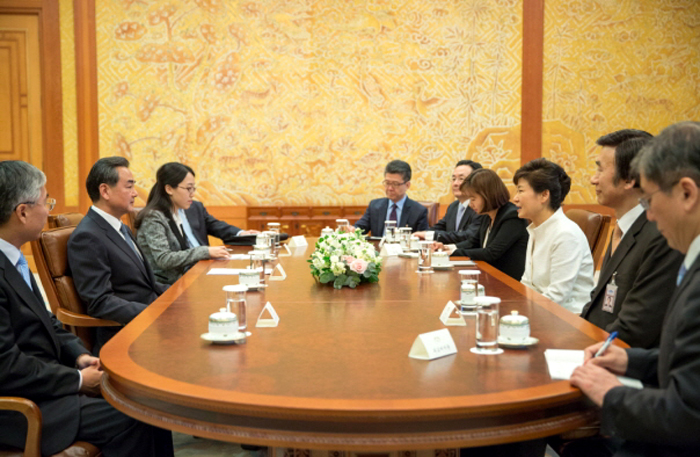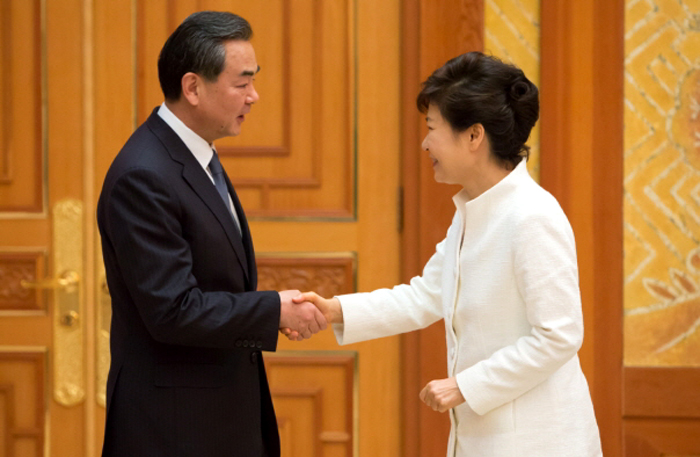-
 Korea.net's 24-hour YouTube channel
Korea.net's 24-hour YouTube channel- NEWS FOCUS
- ABOUT KOREA
- EVENTS
- RESOURCES
- GOVERNMENT
- ABOUT US
President Park Geun-hye met with Chinese Foreign Minister Wang Yi on May 26 to discuss issues of mutual concern, including Korea-China relations and matters concerning the Korean Peninsula.
President Park began with her sincere expression of thanks to her Chinese counterpart Xi Jinping, to his government and to the Chinese people for sending their condolences to the victims and families of the recent ferry tragedy. Then she went on to offer her own condolences to the victims who lost their lives in a series of terrorist attacks in China.
President Park also offered her congratulations on the successful hosting of the Conference on Interaction and Confidence Building Measures in Asia (CICA), a multi-national forum that was held under the chairmanship of President Xi from May 20 to 21.

In response, Chinese Foreign Minister Wang Yi sent special regard from President Xi to the Korean president and offered his condolences to the bereaved families of the ferry victims.
In addition, the Chinese minister sent his gratitude to President Park for her sincere remarks about the recent terrorist attacks that have shocked his country.
President Park took advantage of the meeting to voice her hope that ties between Korea and China have gotten closer and stronger over the past year since her administration took office, and that the two countries would further strengthen their existing relationship to create a new Korean Peninsula and, furthermore, a new Northeast Asia.
Meanwhile, the Chinese foreign minister said that the two countries’ ties couldn’t be any better and he attributed their close ties to the direct leadership and efforts undertaken by the two leaders of Korea and China.
“I value the four rounds of meetings with President Xi that I’ve had, which have helped us to have a closer dialogue and to build trust between each other,” said President Park.
“President Xi’s upcoming state visit to Korea will solidify the mutual strategic cooperative relationship between our two countries,” she said.
On top of that, President Park said that a joint communiqué adopted during her state visit to China in July 2013 is being implemented step-by-step and she emphasized her hope that the two countries would keep up the momentum in terms of the development of the relationship based on the communiqué.
In response, Foreign Minister Wang affirmed that an all-out effort would be made to turn President Xi’s upcoming state visit to Korea into a new milestone in their bilateral ties.
He also emphasized that President Xi’s “Chinese Dream” is on a par with President Park’s “Second Miracle on the Han River” and her vision to open an era of happiness for the Korean people. He hoped that the Chinese president’s visit would take Korea-China strategic cooperation to a new level.

President Park said that they reconfirmed the agreement reached by the two sides during their summit talks in the Hague in March, where they agreed to move toward the non-use of nuclear weapons and toward the denuclearization of North Korea. She also praised the Chinese government's efforts made toward North Korean non-proliferation and said that both nations would continue having in-depth discussions about the issue during Chinese President Xi's upcoming visit to Korea.
President Park said that North Korea feigns to pursue dialogue, but that at the same time it threatens the rest of the world with its ongoing operation of the Yongbyon facilities, leading to the possibility of a new type of nuclear weapons test. If the North is truly willing to have a dialogue, she said, it should stop such ambivalent behavior.
The Chinese foreign minister said that China is prepared to take responsibility in a fair and objective manner as it is the chair country for the Six Party Talks. It hopes to move forward toward denuclearization on the Korean Peninsula.
President Park thanked the Chinese government for its continuous efforts and support for Korea's trust building process on the Korean Peninsula. She also added that the Korean government would patiently strive to improve the North Korean attitude, showing its willingness to open the door for dialogue and to continue cooperation and exchanges, yet still showing its willingness to take a firm stance against any future provocations.
In addition, she emphasized that an improved relationship between North and South Korea, possible through the implementation of the administration's "Dresden Plan," would contribute to peace and stability on the Korean Peninsula, something in which China also has an interest.
Minister Wang emphasized that China is the closest neighbor to both North and South Korea, expressing his hope for denuclearization, for the maintenance of peace and stability on the Korean Peninsula, for an improvement in bilateral relations between Seoul and Pyongyang and for a peaceful and autonomous unification.
President Park and Minister Wang also exchanged views about the improvement of financial cooperation, enhanced surveillance on illegal fishing in the Yellow Sea, ongoing FTA issues between Korea and China, as well as cooperation on the Korean administration's "Eurasia Initiative" and the new "Silk Road Economic Belt" planned by President Xi.
By Wi Tack-whan, Sohn JiAe, Lee Seung-ah
Korea.net Staff Writers
whan23@korea.kr

President Park began with her sincere expression of thanks to her Chinese counterpart Xi Jinping, to his government and to the Chinese people for sending their condolences to the victims and families of the recent ferry tragedy. Then she went on to offer her own condolences to the victims who lost their lives in a series of terrorist attacks in China.
President Park also offered her congratulations on the successful hosting of the Conference on Interaction and Confidence Building Measures in Asia (CICA), a multi-national forum that was held under the chairmanship of President Xi from May 20 to 21.

President Park Geun-hye (third from right) holds a meeting with Chinese Foreign Minister Wang Yi (second from left) at Cheong Wa Dae on May 26. (photo: Cheong Wa Dae)
In response, Chinese Foreign Minister Wang Yi sent special regard from President Xi to the Korean president and offered his condolences to the bereaved families of the ferry victims.
In addition, the Chinese minister sent his gratitude to President Park for her sincere remarks about the recent terrorist attacks that have shocked his country.
President Park took advantage of the meeting to voice her hope that ties between Korea and China have gotten closer and stronger over the past year since her administration took office, and that the two countries would further strengthen their existing relationship to create a new Korean Peninsula and, furthermore, a new Northeast Asia.
Meanwhile, the Chinese foreign minister said that the two countries’ ties couldn’t be any better and he attributed their close ties to the direct leadership and efforts undertaken by the two leaders of Korea and China.
“I value the four rounds of meetings with President Xi that I’ve had, which have helped us to have a closer dialogue and to build trust between each other,” said President Park.
“President Xi’s upcoming state visit to Korea will solidify the mutual strategic cooperative relationship between our two countries,” she said.
On top of that, President Park said that a joint communiqué adopted during her state visit to China in July 2013 is being implemented step-by-step and she emphasized her hope that the two countries would keep up the momentum in terms of the development of the relationship based on the communiqué.
In response, Foreign Minister Wang affirmed that an all-out effort would be made to turn President Xi’s upcoming state visit to Korea into a new milestone in their bilateral ties.
He also emphasized that President Xi’s “Chinese Dream” is on a par with President Park’s “Second Miracle on the Han River” and her vision to open an era of happiness for the Korean people. He hoped that the Chinese president’s visit would take Korea-China strategic cooperation to a new level.

President Park Geun-hye (right) shakes hands with Chinese Foreign Minister Wang Yi on May 26 at Cheong Wa Dae. (photo: Cheong Wa Dae)
President Park said that they reconfirmed the agreement reached by the two sides during their summit talks in the Hague in March, where they agreed to move toward the non-use of nuclear weapons and toward the denuclearization of North Korea. She also praised the Chinese government's efforts made toward North Korean non-proliferation and said that both nations would continue having in-depth discussions about the issue during Chinese President Xi's upcoming visit to Korea.
President Park said that North Korea feigns to pursue dialogue, but that at the same time it threatens the rest of the world with its ongoing operation of the Yongbyon facilities, leading to the possibility of a new type of nuclear weapons test. If the North is truly willing to have a dialogue, she said, it should stop such ambivalent behavior.
The Chinese foreign minister said that China is prepared to take responsibility in a fair and objective manner as it is the chair country for the Six Party Talks. It hopes to move forward toward denuclearization on the Korean Peninsula.
President Park thanked the Chinese government for its continuous efforts and support for Korea's trust building process on the Korean Peninsula. She also added that the Korean government would patiently strive to improve the North Korean attitude, showing its willingness to open the door for dialogue and to continue cooperation and exchanges, yet still showing its willingness to take a firm stance against any future provocations.
In addition, she emphasized that an improved relationship between North and South Korea, possible through the implementation of the administration's "Dresden Plan," would contribute to peace and stability on the Korean Peninsula, something in which China also has an interest.
Minister Wang emphasized that China is the closest neighbor to both North and South Korea, expressing his hope for denuclearization, for the maintenance of peace and stability on the Korean Peninsula, for an improvement in bilateral relations between Seoul and Pyongyang and for a peaceful and autonomous unification.
President Park and Minister Wang also exchanged views about the improvement of financial cooperation, enhanced surveillance on illegal fishing in the Yellow Sea, ongoing FTA issues between Korea and China, as well as cooperation on the Korean administration's "Eurasia Initiative" and the new "Silk Road Economic Belt" planned by President Xi.
By Wi Tack-whan, Sohn JiAe, Lee Seung-ah
Korea.net Staff Writers
whan23@korea.kr
Most popular
- First hearing-impaired K-pop act hopes for 'barrier-free world'
- 'Mad Max' director impressed by 'cinema-literate' Korean viewers
- Romanian presidential couple visits national cemetery
- President Yoon, Japan PM pledge better trilateral ties with US
- President, Romania pledge better defense, nuclear power ties













